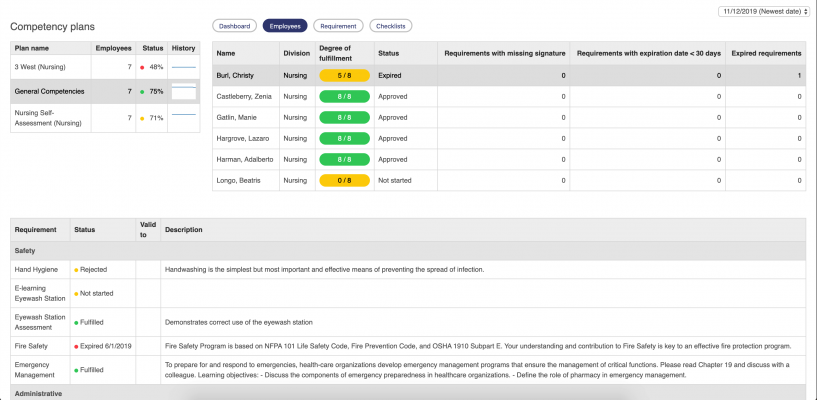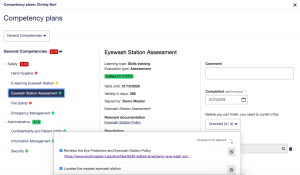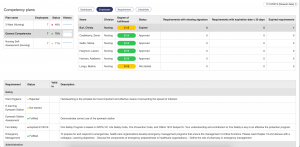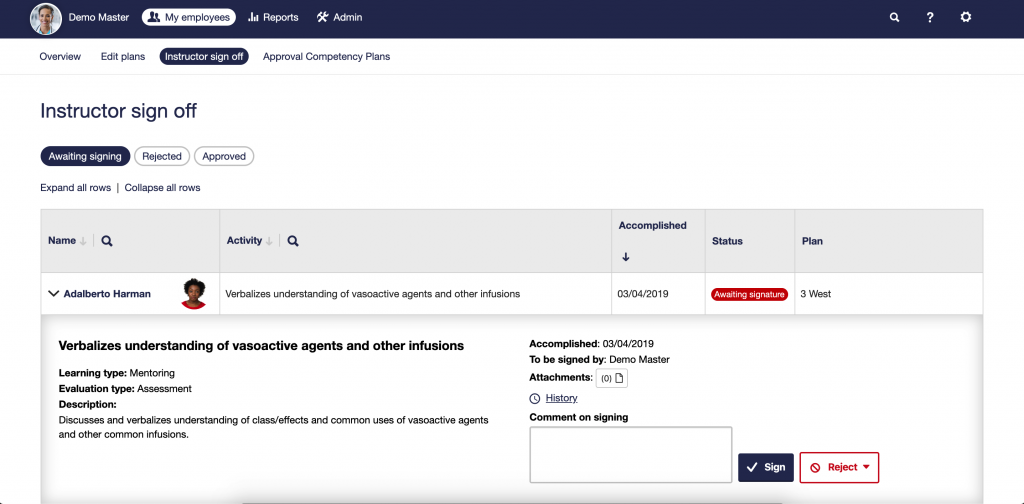Michael Scott, the fictional, bumbling regional office manager played by actor Steve Carell in the hit TV series The Office, never met a pile of paperwork he couldn’t find a way to wheedle out of taking care of. Let’s face it, any desk jockey can feel overburdened by the sheer volume of sheets that stack up on any given workday. And who among us doesn’t get frustrated filling out endless forms or, worse, avoid taking care of them until deadlines beckon? But Scott would likely have run screaming from the building if asked to tackle hospital competency checklists.
Tracking employee competency requirements is one of those thankless, cumbersome, time-consuming administrative tasks that can do a department manager’s head in. It is also a necessary, legally-mandated requirement to ensure a healthcare provider is operating at optimal levels of patient care and safety—while also keeping providers audit-ready.

Merrin Thompson, manager of the nutrition department, has a staff of 35 to 40 employees who each must meet around 40 competency requirements.
Competencies are enforceable requirements that employees must meet to document they are up-to-date on industry standards, safety protocols, procedures, equipment use, and re-certifications. One healthcare employee might be subject to dozens of competency requirements that can require frequent updating, in some cases twice a year. Multiple that by dozens or even hundreds of employees in a department and it’s clear that monitoring competencies can take up a ton of time and labor—and produce vast amounts of paperwork.
Traditionally, paper competency checklists are stored in massive binders. Managers have the unenviable job of tracking down this paperwork, making sure staff complete said paperwork, and checking and compiling the paperwork for internal review. Fun times! In 2018, when a technology innovator at the San Mateo Medical Center learned about a digital solution to such woes, the medical center decided to turn the page on that paperwork problem. Here’s what they came up with.
Curtains for the paper chase
The staff at San Mateo Medical Center was open to exploring streamlined digital solutions to keeping records that might offer a faster, simpler, and more organized way to collect and store information, and potentially reduce the risk of errors and omissions or—at the very least—misplaced paperwork. Accredited healthcare providers, of course, are subject to unannounced Joint Commission audits, known as surveys, every three years. Preparing for these surveys can be challenging, and keeping current on compliance standards is crucial for a host of reasons.
When San Mateo Medical Center’s chief medical information officer Michael Aratow heard about Dossier Healthcare through his technology innovation channels, he thought he might have stumbled onto a service that would be well received at his workplace. The digital platform—a division of Dossier Solutions, a Norwegian-based company that designs competency portals for healthcare, aviation, and government industries—promises real-time competency tracking and offers flexibility, scalability, and centralization. These are all major selling points, especially when compared with the clunky, impractical, and overwhelming binder business the healthcare provider was used to.
“This portal came across my path, and even though we weren’t specifically looking for this kind of technology solution at the time, I thought it might have value for our departments,” says Aratow, an emergency room physician. “Tracking competency requirements—and the paper trail it creates—is its own kind of pain point for managers.”






